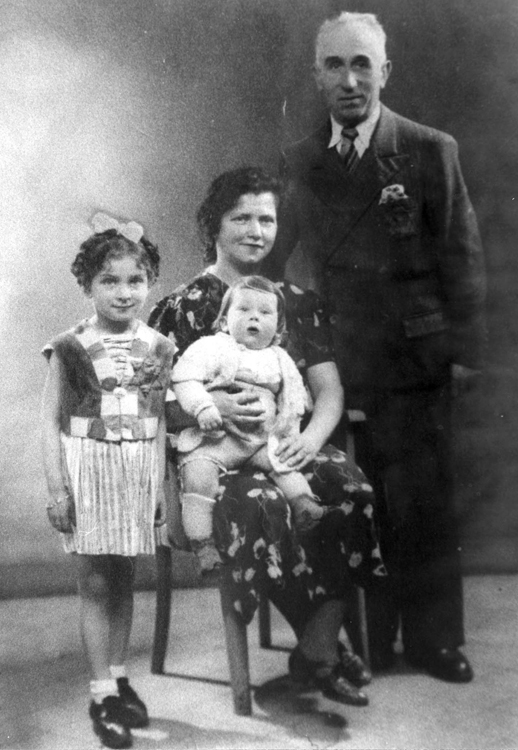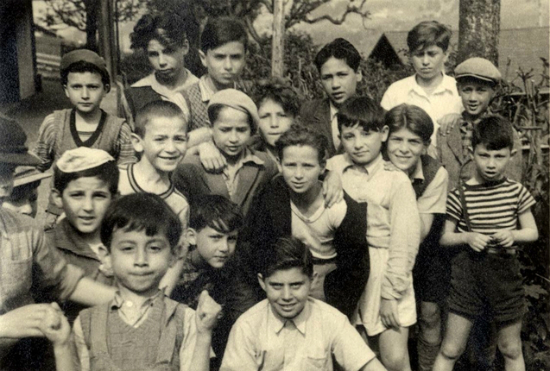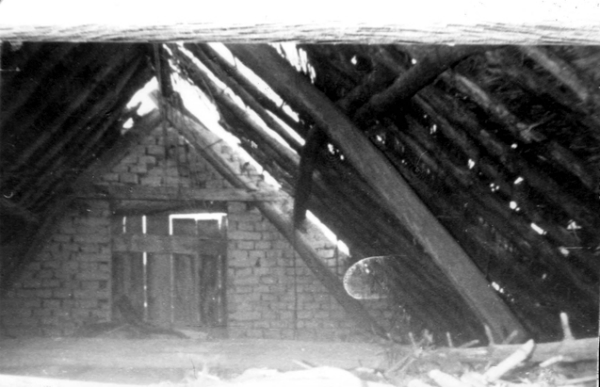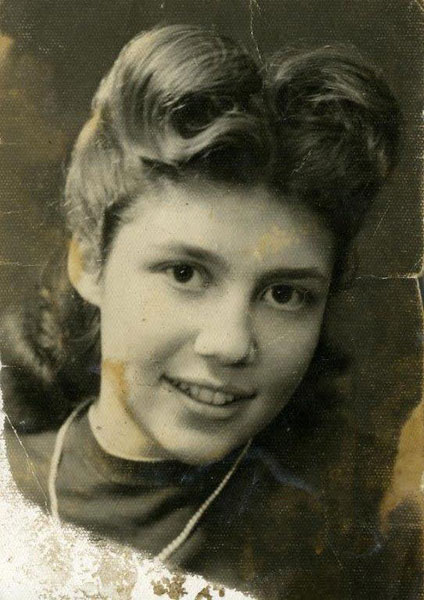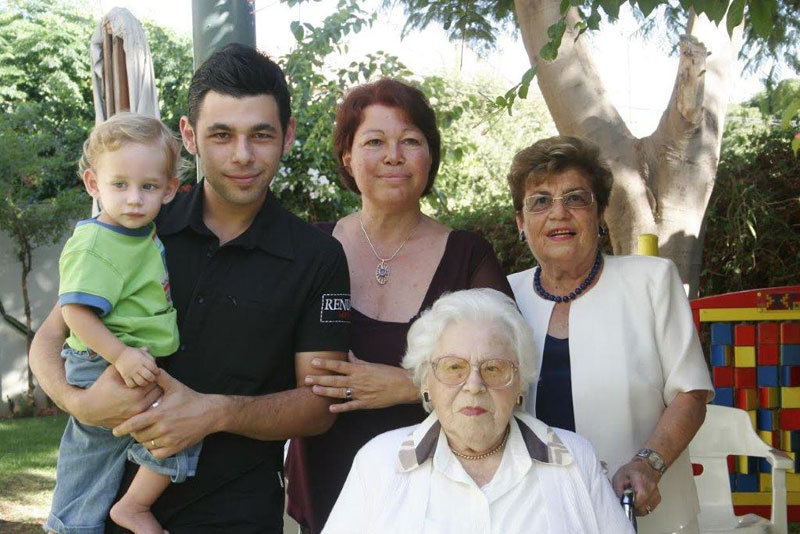Dora Weinberg (née Weissman) was born in German in 1931 to an Orthodox family. After Hitler came to power in Germany, her family moved to Metz in France. In 1939, when the area was annexed to Germany, Dora’s family and other refugees were relocated to Angoulême in western France. After France was occupied by the Germans in June 1940 and the authorities began to detain Jewish men, the family fled to the Free Zone, where they lived as refugees until the zone was occupied by the Germans. At the beginning of 1943, as the situation for the Jews worsened and fear of detention grew, Dora and her sister were transferred to hiding places by representatives of the organization OSE. Later the girls were reunited with their parents. In 1948, Dora made Aliyah with her mother and sister. She married Moshe Weinberger and they had two children. For many years Dora worked as a teacher. She now works in Alumim and coordinates educational projects at Yad Vashem to commemorate the Holocaust in France. She is a member of the committee responsible for granting recognition to Righteous Gentiles. We met with Dora to hear about her experiences during this period.
Could you tell us about your family?
My father, Israel Weissman, was born in Poland to a religious family in the city of Stary. He moved to Germany in 1920 for financial reasons. At first, he stayed in touch with his family back in Poland, but the connection was broken after 1939. My mother was born in 1907 in Cologne, Germany, to an ultra-Orthodox family. My parents married in 1930 and moved from Cologne to Gelsenkirchen, where I was born in 1931.
How did Hitler’s rise to power in 1933 affect you all?
When my father felt that the situation for the Jews in Germany was becoming hard, he decided that we should emigrate to France, following his brother, who was already living there, who told him that things were better there for the Jews. At first we lived in Paris for a few months, and then we moved to the city of Metz in the Alsace-Lorraine region. There was a large community of French Jews in the city known as the “Yekkes” who had been there for many generations, as well as Ostjuden – Jews who had immigrated from Eastern Europe. They worked in commerce and craft shops and were very poor. There was no contact between the two groups.
My father worked together with his brother David in a factory making sacks, and my mother managed the home in a very strict and organized way. We maintained a bourgeois and traditional lifestyle. Our financial situation was good and we didn’t experience any anti-Semitism. In 1934 my brother Daniel was born, but very sadly he died a few months later, and in 1935 my sister Hilde was born. Over time, my parents began to learn French, although we spoke German at home. I went to a non-Jewish girls’ school and to the Jewish Scouts and I felt like any other French girl. My mother stayed in touch with her parents in Germany until 1938 and even went back to visit her parents in Cologne that year. But then they lost contact. I can remember them all – my mother’s parents and sisters. Most of them perished.
What happened in 1938?
That year they evacuated all the Jews from Alsace-Lorraine. So we all became refugees and had to move to western France – several hundred families. We moved to a city called Angoulême. At first it was very hard, even though we received financial assistance from the municipality as refugees, because the evacuation was an official process. After quite a long time my father found work as a merchant in the markets. My mother stayed at home and I went to a girls’ school. There, too, we had a nice home, thanks to my mother, who managed to make the miserable apartment look more aesthetic.
What changed after France was occupied by the Germans in 1940?
We Jews who were left in the Occupied Zone faced a very difficult situation, which included anti-Jewish orders issued by the Germans. At first a curfew was imposed, and Jews were forbidden to leave home after six o’clock in the evening. Jews were also dismissed from their jobs. In July 1942, all the Jews above the age of six had to wear yellow stars – something that was very hard for me as a 10-year-old. My parents had to register with the municipality and
the police because we weren’t considered French and we didn’t have citizenship. This was part of the order requiring all Jews to have word “juif” (“Jew”) stamped on their identity cards. I spoke at the police station because my father’s French wasn’t very good. We received the yellow star at the municipality in return for clothing vouchers. Each of us was given two stars in return for three vouchers each – something that meant that we couldn’t buy clothes or shoes for several months.
How did you react to the order to wear the yellow star?
The first day when I wore the yellow star to school, I saw that some girls were hiding their stars with their books or bag. I was never ashamed and I never hid it. Maybe I was naïve and unaware of how serious the situation was. That same day, the teacher moved the girls with the yellow star to the edge of the class and ignored us. This really annoyed me, but I managed to concentrate on my studies, and particularly on the exam for moving on to high school. Three weeks later, at the end of June, they began to expel all the Jewish children from school, but I was lucky. The teacher told my parents that I was allowed to take the exam because of my achievements at school. School continued until nearly the end of July, but they told us at the beginning of the month that we couldn’t go to school anymore.
What other rules were imposed on you and on the other Jews in France?
One order prohibited Jews from entering public places – swimming pools, parks, cinemas, libraries. That impinged on our way of life. Until then my mother used to take me and my sister on Thursdays to the public baths to prepare for Shabbat. I couldn’t continue to borrow books from the library as I had done before. The librarian, with whom I had been friendly, made this clear to me one day when I went to the library with the yellow star to borrow some books. “Give me the books and get out of here. You can’t come back.” I asked her why and she said, “You have a yellow star.” I sat on the steps and started to cry.
A few days later I was also sent out of a stationery store when I wanted to buy a youth newspaper. I tried to mediate between the French-speaking salesman and a German officer who wanted to buy a pen since I knew both languages. The shopkeeper tried to send me out of the store. The officer said, “Thank you, my girl. Today is a very hard day for you all. Run home.” And on the way home I saw French soldiers shoving Jews into trucks by force, while German soldiers stood by watching. A French boy who lived near my home, and who I’d never spoken to before, said to me, “Are you crazy, walking around the streets today? Don’t you have anything to do? They’re killing all the dirty Jews. Go home.” When I got home, I saw that my father was nervous and agitated and my mother was crying, saying “the girl” over and over. My father explained that this was a very big ‘Aktion’ (over 200 Jewish men were taken) and that we had to run away. I didn’t know exactly how, but someone had warned him that he was on the list of detainees who were supposed to be taken the next day. While I had been wandering the streets all day, he had handed my sister over to a young woman from the OSE organization, which hid and saved children in France during the Holocaust. This woman pretended to be a married woman with two children who lived in the Free Zone, and with the help of a fake transit certificate, she came to see her “parents” in the Occupied Zone. By doing this, she regularly took children from the Occupied Zone and hid them in the Free Zone.
Did you understand what was happening to the Jews?
In the community, people realized that for now they were only taking the Jewish men and that there were concentration camps for Jews. But they didn’t know about the extermination camps. As a little girl, all I heard were strange words like “detention” and “list,” and I didn’t know what they meant. The move to the Free Zone required my parents to send my little sister first. We thought that moving to the Free Zone would save us, although there were quite a lot of camps there, too.
We left the apartment in the middle of the night. My mother dressed me in layers of clothes even though it was summer, because we couldn’t take anything with us. We arrived at the railroad station in Angoulême in the middle of the night. Along the way, my father tore off our yellow stars and threw them away. We got on a train heading for the Free Zone and we sat in the water container with two other Jews we knew. The water came up to our waists and it was cold, but as the train traveled the water got hotter (because like all the trains at that time it worked on coal). When the train stopped at a station my mother put her hand over my mouth. We could hear the Germans shouting and dogs barking. It became clear that the Germans, together with the French police, were taking Jews off the train who had been trying to cross the dividing line with forged documents, or without any documents but without their yellow stars. Then I needed to urinate, and because there were other people there, I was embarrassed and I started to cry. My mother told me to do it, and we went on the journey in unclean water for almost 24 hours. I can still feel and smell the water to this day. Eventually, we arrived in Limoges, which was on the other side of the line in the Free Zone. The engine was detached from the wagons and brought into a railroad hanger, and we waited there until nighttime to avoid inspections by the Germans or the French. In the morning my father began to search for my sister and eventually found her with help from OSE. We stayed with relatives in the city for a few days, until my father decided that it was too complicated to live somewhere without documents or ration cards and with little money. So we traveled to my uncle, who lived in a small town south of Limoges called Lectoure, where there were already some refugees from Alsace-Lorraine.
What was life like in Lectoure?
The town welcomed us very nicely. Like the other refugees, we were given a home. But it was in very poor condition – an abandoned building without running water, electricity, or a toilet. But this home saved our lives. It had an attic where my father arranged a hiding space, and we began a new life. My parents didn’t go to work, but I started school in October, and I think my sister went to kindergarten. A cousin of ours who had fled from Antwerp also lived with us. Her children had been hidden in a children’s home.
Because of the First World War, the inhabitants of this region hated the Germans, and this affected me, because my name – Dora Weissman – sounds German. On one of my first days at school, some boys even attacked me during recess and started to beat me up badly. They called me a “damn German” and I replied that I wasn’t German. “We escaped from the Germans in Angoulême just a few weeks ago – I’m Jewish.” “Jewish?” they retorted, and beat me even harder, calling me a “dirty Jew” and claiming that I had killed the baby Jesus. I went home disheveled, my skirt torn and my notebooks dirty. My mother didn’t want me to go to school anymore, but my father told me to go and promised it would pass. Eventually they moved me to another class, and the teacher told me, “Your name is Denise” – without a surname because he couldn’t give me a false identity card. And that’s how it went. I kept on going to school and I was a good student.
How did life change after the Germans occupied the Free Zone in November 1942?
There weren’t any Germans in the town, although the whole area was occupied. At the beginning of 1943, two French gendarmes knocked loudly on the door. While they were waiting, my father went and hid in the attic. My mother opened the door but she was so scared that she couldn’t understand what they were saying. I went up to them and asked them what was happening. The policeman asked whether my father was at home. I replied that he wasn’t, because he worked for a farmer and he often didn’t come home. The first policeman told the second one that my father was a Jew and he probably didn’t come home because he was drunk and lying by the roadside. The policemen explained that my father was on a list and they had to arrest him. If he came home, he should prepare a small suitcase because they would be coming the next day. These gendarmes actually saved my father’s life by warning us that he was on the list, and they did this deliberately. After all, if they’d come inside and searched, they would have found him. That same night they arrested 22 men aged 20 to over 40.
The next day some boy came to see us and told us that the priest wanted to see my father and hide him. He told me that my father should come at night, and he did so. My father was hidden in the belfry of the church by the priest for a week, together with two other Jews. The priest was a member of the underground and he knew that Jews who were detained were being sent to Drancy and then to the East. I took food to my father at night because he refused
to eat the non-kosher food made by the priest’s housekeeper. A few days later he asked me to bring his tallit instead of food. As a child, I couldn’t understand why my father, as a persecuted Jew, was asking for his tallit rather than food. By running these errands, I was endangering myself, my father, and even the priest who was hiding him.
What happened next?
There were some very big ‘Aktions’ at the time. Women and children were also being arrested, so we had to separate from my mother. It was very hard to leave her. She told me: “Remember one thing: Weissman Palestine.” She was referring to my father’s elder brother, who had managed to reach the Land of Israel.
The rescue networks – Jewish and non-Jewish – took the children from their homes and hid them in various institutions. My sister and I were taken to Toulouse and hidden with a very cruel non-Jewish woman. She shut us up in a small room, left us with a bottle of water and a piece of stale bread, and left the home for several days. I found a small tin on a dresser in the kitchen with cookies in. Every day I took two or three cookies and hid them in my underwear. When the girl began to cry that she was hungry, I would take out one cookie at a time. But when the woman realized what I was doing (the French people themselves didn’t have much food), she threw them away one morning.
I found myself in a large and unfamiliar city without clothes, money, or documents, in the cold month of February. I met two young men and asked them where there was a church, because I knew that priests were saving Jews. One of them replied in Yiddish that I needed a synagogue. They took me to a little office of OSE, asked me lots of questions, and told me that I couldn’t go back to my mother. They sent me to a children’s home run by a nun in the South of France, close to the border with Spain. The nun knew that we were Jews and insisted that we behave just like Christian French children.
What was life like for you in the children’s home at the monastery?
We arrived in a residential school where we spent several months with lots of orphans – the children of fallen or captured soldiers. We were bruised and dirty because we hadn’t bathed during our 10 days in Toulouse. I had lice so the nurse shaved my head and gave me a rag soaked in petroleum to put on. I had beautiful long hair, but not as nice as my little sister. The nurse told me that she would decide in the morning whether to shave my sister’s head, too, because she didn’t have as many lice. I spent the whole night in the bathroom cleaning my sister’s head, and so her hair was saved. I cried when they shaved my head, but a girl called Malvine comforted me and told me that it would grow back in time. She was a few years older than me, and she gave me guidance about how to manage there and how to comfort my sister when she cried.
We had to go to church on Sundays, pray, and even bow down. My sister refused to do this, and I slapped her once because of this. I told her that no-one must see that we were different, because it would endanger us. There were other Jews there, too, but I didn’t know this at the time because they kept quiet.
When did you meet your parents?
My mother found us. She searched the lists and took us out of the children’s home. We moved with our parents and a large group of Jews to Nice, which was under Italian rule. Then we moved on to the Alps and eventually to Switzerland. We entered Switzerland on a cold, snowy night in September 1943, with forged documents, because the Swiss were guarding the borders to prevent Jews from entering. I caught pneumonia and sinusitis because of the journey.
We didn’t feel free in Switzerland. My parents and my little sister were taken to a town called Morgins. My parents were held in a work camp under Swiss control, and the director of the camp, who knew about Drancy, often threatened to send the Jews back to France. My sister stayed in a children’s home inside the camp, while I was sent to a religious school run by Dr. Simon in Bex-les-Bains. Before the war, the school had served girls from wealthy families from across Europe. There, too, they threatened that if we didn’t work, we would be sent back to France. I didn’t see my parents for three years. Because of the sense of abandonment for so many years, some children simply hated their parents. They couldn’t understand that it was done for their own good.
What did you do when the war ended?
For me, the return to normal life was very hard. I’d been without my parents for years and I didn’t know what family life meant. After lots of bureaucracy, we went back to Metz in 1946, but we didn’t find anything there. We rented a miserable apartment, my father began to sell things in the markets, and I went back to school with the help of private lessons because I hadn’t studied for years. A year later my father died. It was very hard. My mother was left alone with two girls in a dismal apartment, without money or work. Her father and sister had made Aliyah from Germany and were living in Bnei Brak, so she decided that we should also move to Israel. We spent a few months in Marseille in a transit camp called Grand Arenas that was run by the Palmach. I was very impressed by the young men from the Palmach.
Can you describe the difficulties of adapting to life in Israel?
I was miserable. Yet again I was taken out of school, which was the only thing that mattered to me. My father had died and I was taken away from French culture, to which I was very devoted. We arrived in Bnei Brak and I didn’t know the language. I couldn’t read the signs and I didn’t understand what people said to me. I knew the prayers, but the everyday language was something else entirely, and there weren’t Ulpanim yet. I only overcame the problems and got used to Israel thanks to my husband, Moshe (a cousin on my mother’s side), whom I married in 1949, and thanks to my children. I went to study French at Bar-Ilan and I worked as a school educator for many years, firstly at Blich in Ramat Gan and later in Kfar Sava.
We’ve been married for 65 years and we have a wonderful family. My two children are Yehudit, who was born in 1951 and now has three grandchildren, and Danny, who was born in 1956 and has two granddaughters.
When did you begin to talk about your experiences from the Holocaust?
I didn’t speak about my experiences from the Holocaust for many years. I didn’t say anything. In fact, as a teacher, I asked for special permission not to come to the Holocaust Day ceremonies for many years. Then one year I told my students what I had been through. I was the class teacher for a 10th-grade class then, and my students had been asked to prepare the Holocaust Day ceremony. The idea was to talk about the Warsaw Ghetto, but I suggested that I tell them about what happened in France. I told them, “You know, I was younger than you are, and I walked around with a yellow star on. There was terrible suffering.” There was absolute silence in the class. The children couldn’t believe what I was telling them, even though I’d been teaching them since eighth grade. They really hadn’t known what happened in France. One boy even asked me whether there had been a Holocaust in France.
After this experience I began to take an interest in the subject, researching and studying. When I retired from teaching, I worked as an inspector for several years. Then they established Alumim, where I’ve been working for 20 years now.
Can you tell us about your work at Alumim?
Alumim is an Israeli association of children who were hidden in France during the Holocaust. At first, the organization concentrated on documenting the history of the Holocaust survivors. Five years ago, in cooperation with France, we launched an educational project to research the history of the Holocaust in France. Because of my background in education, I led the project together with the School of Holocaust Studies at Yad Vashem. This is an important project because for many years many survivors from Western Europe felt that they hadn’t been through the “real Holocaust” like those from the East. I am also a member of the committee at Yad Vashem that recognizes Righteous Gentiles, and I’m responsible for the French Righteous Gentiles.







